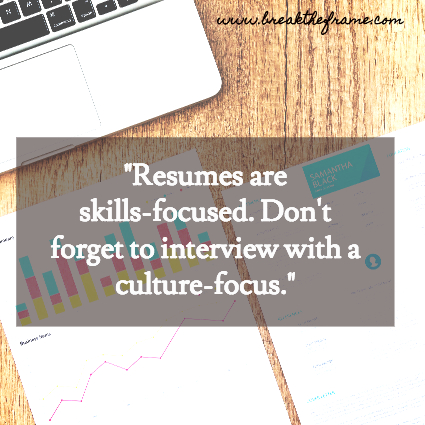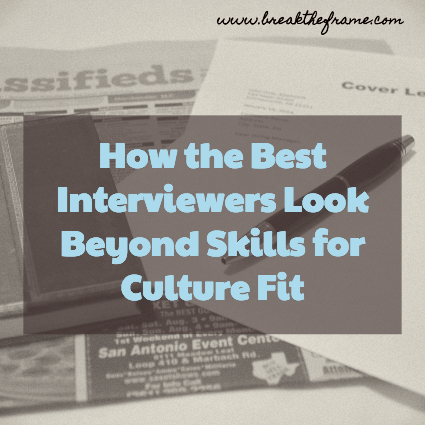One of my favorite times during the year is when high school seniors around the world apply to College. I’m an alumni interviewer for my university, and I’m always humbled and inspired by the applicants I have the privilege to interview.
Most of the students I interview make me feel as if I’d never be admitted to my alma mater again – they are incredible. They are passionate, driven and accomplished all before receiving their high school diploma. If they are any indication of our future, Generation Z is poised to make its mark on the world.
Unlike interviewing for a university, when we interview job applicants, we traditionally focus on their proven fit for the work. We ask questions to understand their experience and how it directly relates to our job opening. Yes, we try to get a sense of who they are but, it’s skills that often rule the day despite the ongoing conversation of hiring for culture fit over skills alone.
I’ve been there, sure I found the right fit for my team, and senior leadership pushed me to hire the person with the stronger resume. Why bother interviewing if all that matters are the accomplishments on a piece of paper? You are more than your resume, why reduce your candidates to skills alone?
When interviewing university applicants, the university admissions committee looks at their grades, and accomplishments but the interviewer has the task of bringing who they are to life. In the case of my university, I don’t even see their high school transcript. It creates an entirely different dynamic that’s focused purely on culture fit. The interviewer is free to uncover those things that make the applicants sparkle beyond their list of achievements on the application form. It’s also the anthesis of the way most corporate organizations operate.
[Tweet “Interviewers need to get to know the heart of a candidate beyond their resume. “]
Of course, when interviewing for the university, we ask “Tell me about a time…” questions, but also pose questions that seem to come out of left field and have them think on their feet and open a window to who they are at their core. More like, “If you were stranded on an island…” than “Please explain…”
I’m a big fan of behavioral interviewing and have conducted training on it for organizations both big and small. Still, there’s a reason that companies like Google, Apple, and Virgin ask some offbeat questions that are more reminiscent of a university interview than for an entry level IT position. They want to see the person sitting across from them thinking on their feet and bringing their best self to something unexpected.
[Tweet “Job candidates are more than skills alone. They’re people, not a piece of paper. “]

How Can You Ask a Question on Culture Fit?
It’s hard to ask questions focused on culture fit if you don’t know what your organization values and who’s thriving and who’s sinking. A great place to start is with yourself.
Before you decide to grill your next candidate with off-the-wall questions, like Trader Joe’s, “What do you think of garden gnomes?” put yourself in your candidate’s shoes. Yes, these questions are designed to learn about your candidate, but with some self-reflection, you can also learn about yourself and your org culture, ultimately better preparing you to make a good choice come offer time.
I’ve been interviewing for my university for nearly a decade and it’s been interesting to reflect on how I may have answered a question when I was 18 vs. now as a forty-something.
One of the schools where I interviewed (but ultimately didn’t apply) was Vassar College. One of the early questions my interviewer hit me with was “If you were a tree, what kind of tree would you be?” To this day, I think it’s a stupid question.
At that same interview, they asked another that’s stuck with me, and I’ve answered again over the years. “What song best describes you? Why?”
Ask yourself: What song best describes you?
Maybe it’s one that doesn’t describe you, but every time you hear it, you feel energized. It’s become your go-to song to tap into your most positive self.
Perhaps the words of a particular song echo your own experience so closely you can’t believe it wasn’t written about you.
After all these years, I still remember my answer, and oddly enough, I’d pick it again. My answer? Hard Headed Woman by Cat Stevens. I picked it because that’s who I want to be for others and for myself.
Knowing that song and where it lands for me, also gives me information about what I value and how I work. Wouldn’t it be great to have that kind of insight into your job candidates? Your team members?
[Tweet “A strong org culture takes more than luck… it starts with values.”]
I’ve yet to ask that question of one of the people I’ve interviewed for my university (if you’re reading this and we have an upcoming interview, I’m still going to surprise you). However, maybe it’s time to start.
We Say Cultural Fit is Most Important. Is it True?
Back to you…
Within our organizations, if we say we value culture fit, how can we shift our interviews away from the nitty gritty of someone’s experience and remember to find out who they are, what they value and what they want from their work (not only what they’ll bring to the table.)
When I interviewed for my first post-college job, I interviewed with the Firm partners and was asked about my directly applicable experience. However, I also had lunch with two people who were not that far ahead of me in their careers. Yes, it was a chance to relax but that lunch was still the interview. We didn’t talk about my resume but I got to know them and they got to know me and we both assessed fit.
Once I worked there, I discovered that the lunches were debriefed with the hiring team. The “who” of the candidate mattered, not only what they brought with them in terms of skill.
Maybe it’s asking different questions or having a different flow but don’t forget the person matters beyond a bright and shiny resume.
My advice? No matter what you do, don’t leave culture fit to chance. A strong resume matters but so does the person whose experience it represents. Don’t sell yourself short and make sure you get to know that person beyond what they’ve accomplished.
PS. I’d love to know. What song best describes you? What about your org culture? Are those two songs in conflict or would they be on the same album?



Yes to culture fit and the specific needs beyond skills. When heading up a start-up, I needed to hire 10 people to help me launch an entirely new organization. Those people needed to be extremely creative, resourceful, passionate & mission driven, patient, kind and generous. Those are not typical resume skills. I interviewed 100 and selected the 10 I thought had the best chance of contributing to success for all. And, it worked, not because of my astute hiring, but because of those peoples’ abilities and personalities to adapt to an emerging, developing culture and helping to define it for others.
By the way, here’s another one of those off the track questions, “What kind of dog would you be and why?”
Gary,
Sounds like you did a great job of finding the right people for your start-up. Proves that you can indeed interview beyond skills successfully. You’re also right – you gave people a chance and they’re the ones who made the magic happen.
What kind of dog would you be?? Ha! Definitely one that doesn’t shed. 😉
Appreciate it every time you share your experience.
Alli
Very interesting post Alli. For companies to find candidates that fit the culture, they must first truly know what they want their culture to be vs. what it is.
I often suggest to them that they before they start the next round of hiring:
– Write down in simple terms what their culture is (this is a bit harder than it sounds)
– Then list (a) attitudes and (b) behaviors that the current employees have and use that illustrate that culture. Example: Teamwork – what is their definition and how does it come to life.
Also, they must decide if they want to evolve/change their culture. If yes, then list out what is the new picture and what attitudes/behaviors will get them there.
All of this detail work, makes it much easier to then create simulations that they can use *during hiring to find candidates that are a culture fit!
—
You have written a very important post and I look forward to reading all the comments.
Kate
Kate Nasser, The People Skills Coach™
Good advice, Kate. I’ve worked with organizations to transition their culture and too often they looked at what they wanted to create but missed the step of looking at the strengths that they wanted to keep too. Can be tough to go through the transformation process without a skilled facilitator too. Outside experts give everyone a chance to be a part of the culture change process.
Great insights. Thanks for sharing them here!
Alli
Well done Alli! Culture fit is key for both organizations and individuals they hire. I have noticed with the Millennials that being in an organization that supports their values and appreciates their gifts is critical. They know who they are and what is important to them.
For organizations it is essential to understand clearly what communication styles and core values are important to them before looking to hire new people.
Thanks Alli and will share!
I wonder if Gen X and potentially Boomers are more willing to flex on what’s important to them for the “right” job. Thing is, when we know it’s a mismatch and squeeze in anyway, it’s wrong all-around. I’ve lived through it.
I also think orgs need to be honest about their culture… not only the one they want but the one they have NOW when making hires.
Thanks, Terri!
Great article, Alli! And I can see why you picked “Hard Headed Woman” by Cat Stevens…you knew you were going to kick butt when you hit the real world! You’ve offered solid advice on how leaders can help create the right culture fit for their companies. Often, it’s really a matter of leaders understanding that they need to define their corporate culture and then hire accordingly….
I think I’ll always love Hard Headed Woman. It’s the mentally tough part of me that keeps shining through 🙂
You can hire and see what culture comes through or do it with intention. It can be hard to pass on a “great resume” when it’s the wrong person presenting it.
Thanks, LaRae!
Alli
Alli,
Cultural fit is important, as is getting to know the mindset and behaviors of the candidate. Getting the interviewee out of the office helps with both. Go to lunch or breakfast once or twice. If nice outside, go for a walk around the building and have a conversation. Getting interviewees out of the stage of interviewing will help to get to know the person.
Jon
I’m with you, Jon. Leaving behind the formality of a cross-the-desk interview gives us new insight into our candidates. Equally important, it gives them a deeper insight into the organization and its leaders too.
I especially like your idea of taking a walk. I’m reminded of when I was interviewed years ago, and we both brought our lunch to a bench in the outdoor courtyard. We got to know each other beyond the open position and my fit.
Many thanks!
Alli